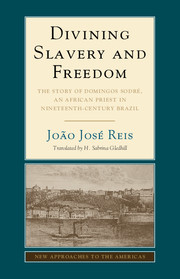 Divining Slavery and Freedom
Divining Slavery and Freedom Published online by Cambridge University Press: 05 May 2015
The police accused two people of consorting with Domingos Sodré in relation to Candomblé in 1862. They were Manoel Joaquim Ricardo and Antão Pereira Teixeira, also African freedmen. In searching the archives, I have found another freedman who enjoyed Domingos' friendship and had been arrested about ten years earlier for running a small Candomblé terreiro in the sugar plantation Recôncavo. His name was Cipriano José Pinto. A summary of the biographies of these three supporting characters, their strategies for survival and success in Bahian society, their victories and defeats, sheds further light on the complex experience of a segment of the African community, the freedpersons or libertos, to which Domingos belonged and in which he circulated. Slave/master relations, family, work, property – including property in slaves – business acumen, intra-African solidarity, competition, and conflict, relations with state authorities, especially the police, spiritual afflictions, and religious affiliations are some of the themes explored in the lives of the three individuals portrayed here. Through them we will further explore the complexities of both slavery and freedom in nineteenth-century Bahia.
MANOEL JOAQUIM RICARDO
João, the young slave arrested in Domingos' home in 1862, belonged to a successful transatlantic merchant, businessman, and slaveholder, Manoel Joaquim Ricardo, a Hausa freedman who then lived in Cruz do Cosme, the rural district ruled by subdelegado João de Azevedo Piapitinga, which was also home to Libânio José de Almeida and others charged with practicing witchcraft and Candomblé in Chapter 1 of this book. Manoel Joaquim, for instance, met Libânio in church, having at least once, in 1862, performed a baptism together in which the latter stood godfather and the former “touched Our Lady's crown” – meaning that the Mother of God was the godmother – on behalf of a creole child. Ricardo, it should be recalled, was a friend and neighbor, but also a compadre of Elias Seixas, who chose him and his wife as the godparents for his baby daughter.
To save this book to your Kindle, first ensure no-reply@cambridge.org is added to your Approved Personal Document E-mail List under your Personal Document Settings on the Manage Your Content and Devices page of your Amazon account. Then enter the ‘name’ part of your Kindle email address below. Find out more about saving to your Kindle.
Note you can select to save to either the @free.kindle.com or @kindle.com variations. ‘@free.kindle.com’ emails are free but can only be saved to your device when it is connected to wi-fi. ‘@kindle.com’ emails can be delivered even when you are not connected to wi-fi, but note that service fees apply.
Find out more about the Kindle Personal Document Service.
To save content items to your account, please confirm that you agree to abide by our usage policies. If this is the first time you use this feature, you will be asked to authorise Cambridge Core to connect with your account. Find out more about saving content to Dropbox.
To save content items to your account, please confirm that you agree to abide by our usage policies. If this is the first time you use this feature, you will be asked to authorise Cambridge Core to connect with your account. Find out more about saving content to Google Drive.